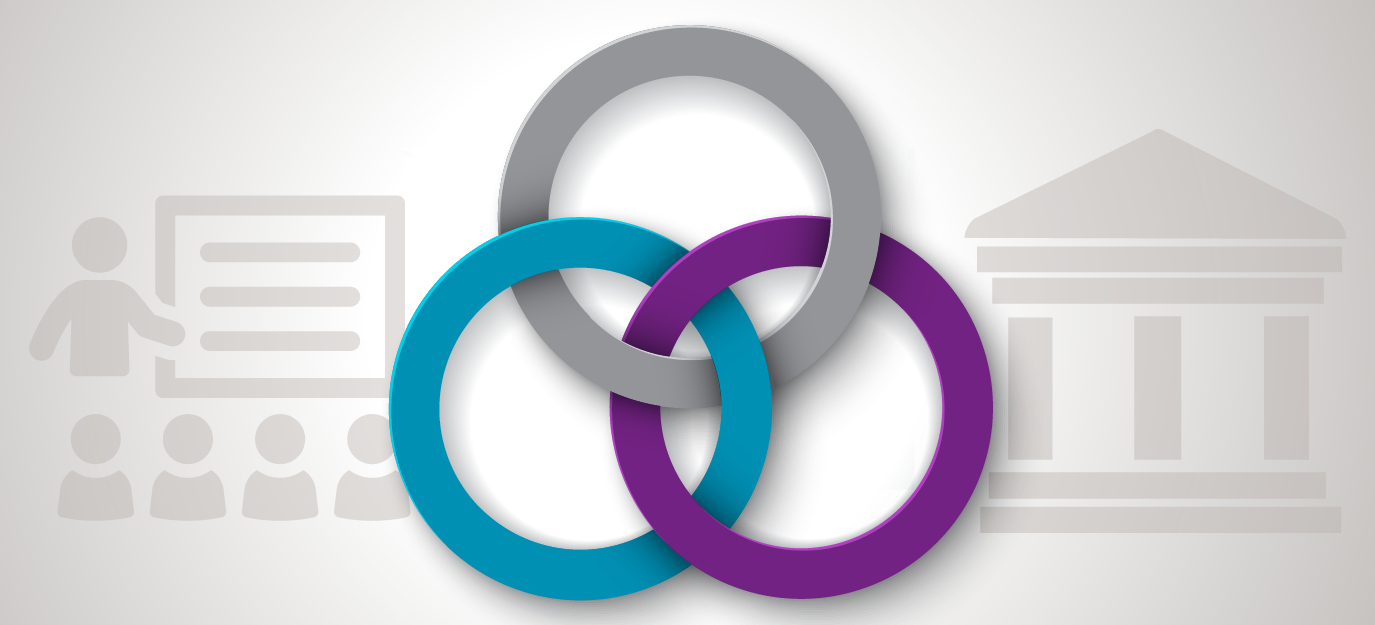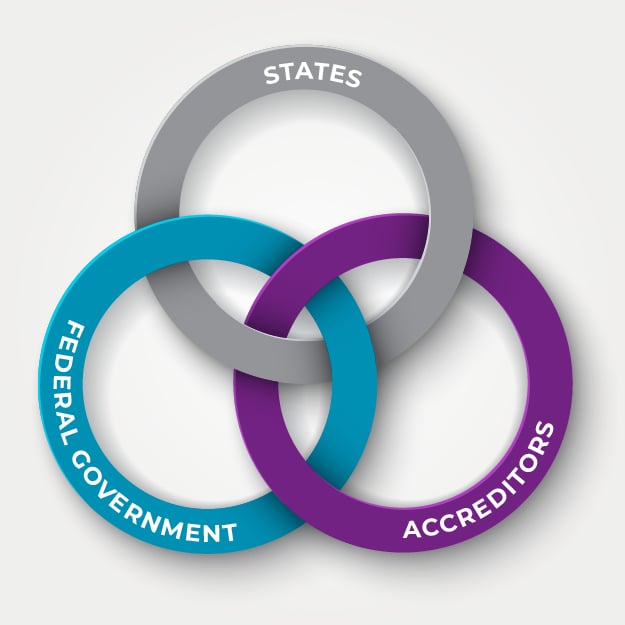
Triad News
Triad News
One Big Beautiful Bill (Budget Reconciliation Bill) Implementation

In August, HLC joined with numerous other higher education organizations to offer comments on the U.S. Department of Education’s pending implementation of the budget reconciliation bill, also known as One Big Beautiful Bill.
In July, the Department announced that it would immediately begin implementing some of the provisions in the budget reconciliation bill, including changes to income-based repayment of certain federal loans and loan limits for part-time students, and reinstatement of previous borrower defense repayment regulations and closed school loan discharge regulations.
To further implement the budget reconciliation bill, the Department intends to convene two negotiated rulemaking committees: a Reimagining and Improving Student Education (RISE) Committee and an Accountability in Higher Education and Access through Demand-driven Workforce Pell (AHEAD) Committee.
The RISE Committee will address student loan issues, while the AHEAD Committee will focus on issues such as institutional accountability measures, the proposed new Workforce Pell Grant program, and other issues related to the budget reconciliation bill.
Accrediting agencies are a constituent group for the AHEAD Committee and HLC, as a member of the Council of Regional Accrediting Commission (C-RAC), intends to be represented in that manner. The RISE Committee will meet over several sessions from September-November. The AHEAD Committee will meet over several sessions in December and January.
Transparency in Admissions and Related Data Reporting
In August, the White House issued an Executive Order regarding Ensuring Transparency in Higher Education Admissions. Among other things, the Executive Order directs the Department to take specific actions regarding Integrated Postsecondary Education Data System (IPEDS) in the areas of technological improvements and enhanced data reporting.
Following the Executive Order, the Department issued a directive to IPEDS and other data-collection areas of the Department requiring that the Department collect, and thus that institutions provide, additional data related to admissions. Further information provided by the Department also included a notification regarding a new “Admissions and Consumer Transparency Supplement” for certain four-year institutions with “selective” admissions. Comments can be provided until October 14, 2025.
Public Service Loan Forgiveness Regulations
In September, HLC joined over 40 other higher education associations in sending a letter to the Department regarding proposed changes to the Public Service Loan Forgiveness (PSLF) program. The letter requests that the Department reconsider its proposal to disqualify from the PSLF program 501(c)(3) employers considered to be engaging in “activities that have a substantial illegal purpose.” This includes organizations “aiding or abetting violations of… Federal immigration laws”; engaging in certain medical activities related to children; and “engaging in a pattern of aiding and abetting illegal discrimination,” or of violating state laws related to matters such as public nuisance and vandalism.
If finalized, the regulations will become effective July 1, 2026.
Revised Interpretation and Clarifications to Previous Guidance
Over the past few months, the Department has issued revised interpretations and clarifications in several areas. For example:
- 90/10 Rule: In July, the Department issued a revised interpretation and clarification regarding the 90/10 rule for for-profit institutions. The 90/10 rule requires that “proprietary institutions derive not less than 10 percent of their revenue from non-federal sources.” Under the revised interpretation, proprietary institutions may now include revenue from certain “ineligible programs” in their 90/10 calculations.
- Career and Technical Education Eligibility: In July, the Department issued a revised interpretation and clarification regarding student eligibility and program eligibility for certain funding related to career and technical education programs. As a result of the guidance, among other things, certain funding involving career and technical education programs is not available to non-citizens that do not fall within defined categories of “qualified aliens.”
- Federal Work Study Activities: In August, the Department issued revised guidance regarding the types of work that may be performed by students who are participating in Federal Work Study programs. Pursuant to the guidance, students participating in Federal Work Study may not engage in any “partisan or non-partisan voter registration, voter assistance…or serving as a poll worker.”
Prison Education Program Accreditation Requirements
In August, the Department solicited comments regarding the existing regulations for Prison Education Programs (PEPs), including requirements regarding initial evaluation of PEPs, follow-up site visits, and review of methodology. Comments can be provided until October 20, 2025.
Joint Report on Workforce Development
In August, the U.S. Department of Labor, U.S. Department of Education, and the U.S. Department of Commerce published a joint report titled “America’s Talent Strategy: Equipping American Workers for the Golden Age.” The report follows the President’s Executive Order from April 2025 on Preparing Americans for High-Paying Skilled Trade Jobs of the Future. The report states five pillars for enhancing a new workforce vision, including industry-driven strategies, worker mobility, integrated systems, accountability, and flexibility and innovation. The report offers “alternatives to 4-year college degrees,” and discusses numerous initiatives involving community colleges.
Department of Justice Guidance Regarding Unlawful Discrimination
In July, the Department of Justice issued Guidance for Recipients of Federal Funding Regarding Unlawful Discrimination. The guidance, which “clarifies the application of federal antidiscrimination laws to programs or initiatives that may involve discriminatory practices,” applies to all entities receiving federal funds, including institutions of higher education.
Under Secretary Confirmation
Nicholas Kent was confirmed and sworn in as the Under Secretary of Education. Kent has indicated that one of his priorities is to “ensure that our taxpayer-supported colleges, universities, vocational schools, and other postsecondary programs are genuinely helping young Americans launch and grow their careers.” Both C-RAC and HLC sent letters welcoming Under Secretary Kent to the Department.
Advocacy Agenda
HLC maintains an Advocacy Agenda that outlines its advocacy priorities related to federal and state regulations and legislation that apply to accreditation and higher education.
HLC’s Relationship Within the Triad
HLC has developed a statement on its Relationship Within the Triad to explain the shared oversight and the interconnected higher education environment in the United States. In particular, HLC notes in its statement that:
“The college or university’s mission is central to HLC’s accreditation and assurance of academic quality. In determining whether institutions meet HLC requirements, HLC considers the institution’s mission. An accredited institution demonstrates how it meets HLC requirements through a mission-reflective lens.
…
Should any of HLC’s requirements overlap with requirements from other members of the Triad, we work with the other Triad members to identify these situations and limit the burden on the institution.
HLC does not prescribe how a member institution meets HLC’s requirements. If a requirement of another entity of the Triad may appear to limit an institution’s ability to meet HLC’s requirements in a particular manner, an institution has the flexibility within HLC’s requirements to identify other ways to demonstrate it meets HLC’s requirements.”
Questions?
Contact [email protected].
Stay Connected
Subscribe to our email interest list to get news updates from HLC.
